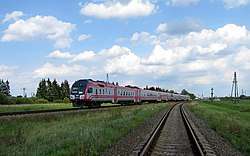Pasažieru vilciens
Pasažieru vilciens ("Passenger train", abbreviated: PV) is the only passenger-carrying railway company in Latvia, operating both electric and diesel trains on various lines throughout the country. It was formed in November 2001 by bringing together two separate companies, PPU "Elektrovilciens" ("Electric Train") and PPU "Dīzeļvilciens" ("Diesel Train"), under one name, creating the first subsidiary of Latvian Railways (Latvijas dzelzceļš). As of October 2008 JSC "Pasažieru vilciens" is an independent state-owned company. As of 2017, the company employed 1,075 people.[2]
 | |
 | |
| Public company | |
| Industry | Public transportation |
| Founded | 2001 |
| Headquarters | |
Area served | Latvia |
Key people | Rodžers Jānis Grigulis (Chairman of the Board) |
Number of employees | 1,048[1] (2018) |
| Website | www.pv.lv |
Pasažieru vilciens | |||||||||||||||||||||||||||||||||||||||||||||||||||||||||||||||||||||||||||||||||||||||||||||||||||||||||||||||||||||||||||||||||||||||||||||||||||||||||||||||||||||||||||||||||||||||||||||||||||||||||||||||||||||||||||||||||||||||||||||||||||||||||||||||||||||||||||||||||||||||||||||||||||||||||||||||||||||||||||
|---|---|---|---|---|---|---|---|---|---|---|---|---|---|---|---|---|---|---|---|---|---|---|---|---|---|---|---|---|---|---|---|---|---|---|---|---|---|---|---|---|---|---|---|---|---|---|---|---|---|---|---|---|---|---|---|---|---|---|---|---|---|---|---|---|---|---|---|---|---|---|---|---|---|---|---|---|---|---|---|---|---|---|---|---|---|---|---|---|---|---|---|---|---|---|---|---|---|---|---|---|---|---|---|---|---|---|---|---|---|---|---|---|---|---|---|---|---|---|---|---|---|---|---|---|---|---|---|---|---|---|---|---|---|---|---|---|---|---|---|---|---|---|---|---|---|---|---|---|---|---|---|---|---|---|---|---|---|---|---|---|---|---|---|---|---|---|---|---|---|---|---|---|---|---|---|---|---|---|---|---|---|---|---|---|---|---|---|---|---|---|---|---|---|---|---|---|---|---|---|---|---|---|---|---|---|---|---|---|---|---|---|---|---|---|---|---|---|---|---|---|---|---|---|---|---|---|---|---|---|---|---|---|---|---|---|---|---|---|---|---|---|---|---|---|---|---|---|---|---|---|---|---|---|---|---|---|---|---|---|---|---|---|---|---|---|---|---|---|---|---|---|---|---|---|---|---|---|---|---|---|---|---|---|---|---|---|---|---|---|---|---|---|---|---|---|---|---|---|---|---|---|---|---|---|---|---|---|---|---|---|---|---|---|---|---|
Electric lines | |||||||||||||||||||||||||||||||||||||||||||||||||||||||||||||||||||||||||||||||||||||||||||||||||||||||||||||||||||||||||||||||||||||||||||||||||||||||||||||||||||||||||||||||||||||||||||||||||||||||||||||||||||||||||||||||||||||||||||||||||||||||||||||||||||||||||||||||||||||||||||||||||||||||||||||||||||||||||||
| |||||||||||||||||||||||||||||||||||||||||||||||||||||||||||||||||||||||||||||||||||||||||||||||||||||||||||||||||||||||||||||||||||||||||||||||||||||||||||||||||||||||||||||||||||||||||||||||||||||||||||||||||||||||||||||||||||||||||||||||||||||||||||||||||||||||||||||||||||||||||||||||||||||||||||||||||||||||||||
PV currently operates ten routes (four electric, six diesel) with its main operating base being the capital city, Riga.[3]
Routes
JSC "Pasažieru vilciens" makes the passenger transports in the following electric train routes:
- Rīga – Carnikava – Saulkrasti – Skulte
- Rīga – Dubulti – Sloka – Ķemeri – Tukums 1 – Tukums 2
- Rīga – Jelgava
- Rīga – Ogre – Lielvārde – Aizkraukle
and in the following diesel train routes:
- Rīga – Dobele – Liepāja
- Rīga – Krustpils – Daugavpils
- Rīga – Krustpils – Rēzekne – Zilupe
- Rīga – Pļaviņas – Madona
- Rīga – Sigulda – Valmiera – Valga
| Riga to | Locomotive | Coach | Approximate | Notes | |
|---|---|---|---|---|---|
| ticket price (euro) | travel time | ||||
| Aizkraukle | D/E | O/K | 2.18 - 3.60 | 1 h - 1 h 36 min | |
| Carnikava | E | O | 1.05 - 1.40 | 39 min - 42 min | |
| Cēsis | D | O/K | 3.50 | 1 h 15 min - 1 h 49 min | |
| Daugavpils | D | O/K | 7.05 - 7.75 | 2 h 41 min - 3 h 36 min | |
| Dobele | D | O | 2.85 | 1 h 07 min - 1 h 08 min | |
| Jelgava | D/E | O | 1.43 - 2.15 | 40 min - 45 min | |
| Jūrmala | E | O | 1.05 - 1.40 | 26 min - 36 min | |
| Krustpils | D | O/K | 4.40 - 5.10 | 1 h 35 min - 2 h 23 min | |
| Lielvārde | D/E | O | 1.43 - 2.15 | 47 min - 1 h 05 min | |
| Liepāja | D | O | 7.20 | 3 h 15 min | |
| Līvāni | D | O/K | 5.35 - 6.05 | 1 h 58 min - 2 h 39 min | |
| Madona | D | O | 5.25 | 2 h 34 min | |
| Ogre | D/E | O/K | 1.05 - 2.10 | 27 min - 48 min | |
| Pļaviņas | D | O/K | 4.00 - 4.70 | 1 h 21 min - 2 h 06 min | |
| Rēzekne | D | O/K | 7.20 - 7.90 | 2 h 44 min - 3 h 36 min | |
| Saulkrasti | E | O | 1.43 - 1.90 | 59 min - 1 h 14 min | |
| Sigulda | D | O/K | 1.90 | 53 min - 1 h 24 min | |
| Tukums 1 | E | O | 1.80 - 2.40 | 1 h - 1 h 18 min | |
| Valga, Estonia | D | O/K | 5.60 | 2 h 41 min - 3 h 18 min | Shared station with Valka, Latvia. |
| Valmiera | D | O/K | 4.20 | 1 h 51 min - 2 h 37 min | |
| Vecāķi | E | O | 0.60 - 0.80 | 26 min - 27 min | |
| Zilupe | D | O | 8.75 | 4 h 35 min - 4 h 39 min | |
| Locomotive | Coach | |||
|---|---|---|---|---|
| D | Diesel | O | open seating | |
| E | Electric | K | reserved seating and a higher level of comfort | |
Stations
The main stations on the PV network are:
Rolling stock
The current rolling stock consists of mainly elderly Soviet-period trains built locally by Rīgas Vagonbūves Rūpnīca (RVR), although some have been refurbished in recent years.[4] In 2016 PV received 19 modernized DR1A DMU train wagons from DMU vilcieni in cooperation with RVR, Daugavpils Lokomotīvju Remonta Rūpnīca and Zasulauks depot. However, LSM reported in October 2016 that the refurbished wagons soon experienced quality issues.[5]
The livery of electric trains and some diesel trains is yellow and blue, while some refurbished DMUs are in red and white.[6]
| Class | Type | Number | Year | Manufacturer |
|---|---|---|---|---|
| DR1A | DMU | 31 | 1973 | RVR |
| DR1AC | DMU | 19 | 2016 | DMU vilcieni with RVR |
| DR1AM | DMU | 10 | 1998 | RVR |
| ER2 | EMU | 108 | 1962 | RVR |
| ER2T | EMU | 23 | 1987 | RVR |
| unknown | EMU | 32 | 2021 (planned) | Škoda Vagonka |
Future upgrades
The first project for the procurement of new trains was announced in 2010 and 2011.[7][8] In 2012 PV ordered 34 three-car electric multiple unit trains and seven three-car diesel multiple unit trains from CAF to be built on the Civity platform, with plans to manufacture them in cooperation with RVR.[9] Later that year the contract was halted due to irregularities and an appeal from Stadler with the European Commission, an initial financial supporter of the project, and a new procurement organized. A hire/purchase contract for 25 Stadler FLIRT EMUs was likewise cancelled in July 2014 after an appeal from the other participant, Hyundai Rotem, and another tender organized.[10][11][12]
In December 2015, four contenders – Talgo, CAF, Stadler Polska and Škoda Vagonka – continued participation in the second stage of the train procurement project. The contract includes the delivery of 32 electric trains with a capacity of 450 each, from 2020 to 2023, maintenance equipment, spare parts for five years and staff training.[13][14] Talgo's VitTal was announced as the provisional winner of the €225.3 million contract in November 2018 although Škoda rejected the methodology used to assess price competitiveness.[15] Škoda and CAF filed a successful appeal of the results of the procurement in December, while Stadler expressed disappointment at the results.[16][17] After reviewing the results of the contest under instructions from the government's procurement watchdog agency, the Procurement Monitoring Bureau (PMB), PV announced on February 15, 2019 that the offer from Škoda worth €241.88 million has been selected as the new winner, based on revised electricity consumption cost estimates.[18] Talgo announced in a press release the same day that they will contest the decision.[19]
On May 21, 2019, PV announced that after the second revision of the submitted bids, Škoda was again confirmed as the winner, however, the decision could yet again be contested. The offer of Talgo was mentioned as to have had a lower price per unit, but the maintenance costs of Škoda trains were found to be lower with the total cost lower as well.[20][21] Minister of Transport Tālis Linkaits commented on this that due to potential issues regarding the implication of Škoda Transportation A.S., a subsidiary of Škoda Transportation Group and a sister company of Škoda Vagonka, in recent corruption scandals concerning the Rīgas Satiksme public transport company, a failure to wrap up the procurement by the end of the year might lead to the dissolution of PV.[22][23] The PMB turned down the final complaint by Talgo on July 4, giving PV the go-ahead to sign a contract with Škoda Vagonka.[24] In a statement, the PV predicted that they would receive the first trains in late 2021, with the last ones being shipped in late 2023.[25]
The contract between PV and Škoda Vagonka a.s. was finally signed on 30 July 2019. Under the agreement, all 32 EMU trains have to be delivered by 2023 or 140 weeks after the contract takes effect.[26][27] Each 109-meter-long four-car train with a top speed of 160 km/h will accommodate 436 seated and 450 standing passengers. The trains are expected to operate services from Riga to Aizkraukle, Tukums, Jelgava and Skulte, as well as the inter-urban routes from to Krustpils, Daugavpils and Rēzekne which are expected to be electrified at 25 kV 50 Hz for completion by the end of 2023.[28][29] In February 2020, a new yellow and gray livery design created by Teika Design Studio for the future trains was unveiled by PV.[6]
References
- https://www.pv.lv/lv/par-mums/personals/personala-statistika/; retrieved: 9 September 2019.
- Personāla statistika (in Latvian)
- "About us". Pasažieru Vilciens. Retrieved 2018-10-22.
- "Rolling stock". Rail Fan Europe. Retrieved 2019-05-22.
- "Modernized diesel trains prove to be a headache". Public Broadcasting of Latvia. 2016-10-03. Retrieved 2019-05-21.
- "We'll all live in a yellow vilciens - new trains to get eye-catching paint scheme". Public Broadcasting of Latvia. 2020-02-13. Retrieved 2020-08-02.
- "IUB atļauj Pasažieru vilcienam slēgt līgumu ar CAF par pasažieru vilcienu iepirkumu". Diena.lv (in Latvian). 2011-10-24. Retrieved 2019-02-15.
- "Meklēt | LR Iepirkumu uzraudzības birojs". Procurement Monitoring Bureau of the Republic of Latvia - Iepirkumu uzraudzības birojs (in Latvian). Retrieved 2019-02-15.
- "CAF wins Latvian train contract". Railway Gazette International. 10 April 2012.
- "Pasazieru vilciens awarded Stadler the contract for leasing new EMUs". Think Railways. 3 July 2014. Archived from the original on 15 August 2016. Retrieved 4 June 2016.
- "Pasazieru vilciens new board stops train procurement process". Think Railways. 23 July 2014. Archived from the original on 15 August 2016. Retrieved 4 June 2016.
- "New passenger train tender halted". Public Broadcasting of Latvia. 2014-07-23. Retrieved 2019-02-15.
- "Five contenders approved for second stage of train procurement project in Latvia". Baltic News Network. 29 December 2015.
- "Spain's Talgo to supply electric trains to Latvia for €225.3m". Public Broadcasting of Latvia. 2018-11-21. Retrieved 2019-01-02.
- "Talgo selected for Latvian EMU contract". Railway Gazette. 22 November 2018.
- "Spain's CAF contests tender to supply electric trains to Pasažieru vilciens". Public Broadcasting of Latvia. 2018-12-04. Retrieved 2019-01-02.
- "Pasažieru vilciens prohibited from signing train procurement contract with Talgo". Baltic News Network. 2019-01-28. Retrieved 2019-02-15.
- "Latvian EMU order goes to Skoda after tender re-evaluation". International Railway Journal. 2019-02-15. Retrieved 2019-02-15.
- "Passenger Rail picks Škoda Vagonka for electric train procurement". Public Broadcasting of Latvia. 2019-02-15. Retrieved 2019-02-15.
- "Results of electric train procurement might lead to liquidation of PV - Linkaits". The Baltic Course | Baltic States news & analytics. 2019-05-21. Retrieved 2019-05-21.
- "Tender award to Skoda may lead to closure of Passenger Rail, says minister". Public Broadcasting of Latvia. Retrieved 2019-05-21.
- "Minister says results of train procurement suggest possible liquidation of Pasažieru vilciens". Baltic News Network - News from Latvia, Lithuania, Estonia. 2019-05-21. Retrieved 2019-05-21.
- "Linkaits: Elektrovilcienu iepirkuma rezultāti liek domāt par "Pasažieru vilciena" likvidēšanu". Public Broadcasting of Latvia (in Latvian). 2019-05-21. Retrieved 2019-05-21.
- Anstrate, Vita (2019-07-04). "Major train deal can finally leave the station". Public Broadcasting of Latvia. Retrieved 2019-07-04.
- "Pasažieru vilciens: Jauno vilcienu iepirkumā pastāv iespēja piesaistīt ES fondu līdzekļus". Baltic News Network (in Latvian). 2019-07-04. Retrieved 2019-07-04.
- "Pasazieru Vilciens signs train purchase contract with Skoda | News | LETA". www.leta.lv. 2019-07-30. Retrieved 2019-08-01.
- "Latvia's Pasažieru vilciens and Czech Škoda Vagonka sign train supply contract". Baltic News Network. 2019-07-30. Retrieved 2019-08-01.
- Barrow, Keith (2019-07-30). "Latvian EMU order finally signed". International Railway Journal. Retrieved 2019-08-01.
- "Škoda signs Latvian EMU contract". Railway Gazette. 2019-07-30. Retrieved 2019-08-01.